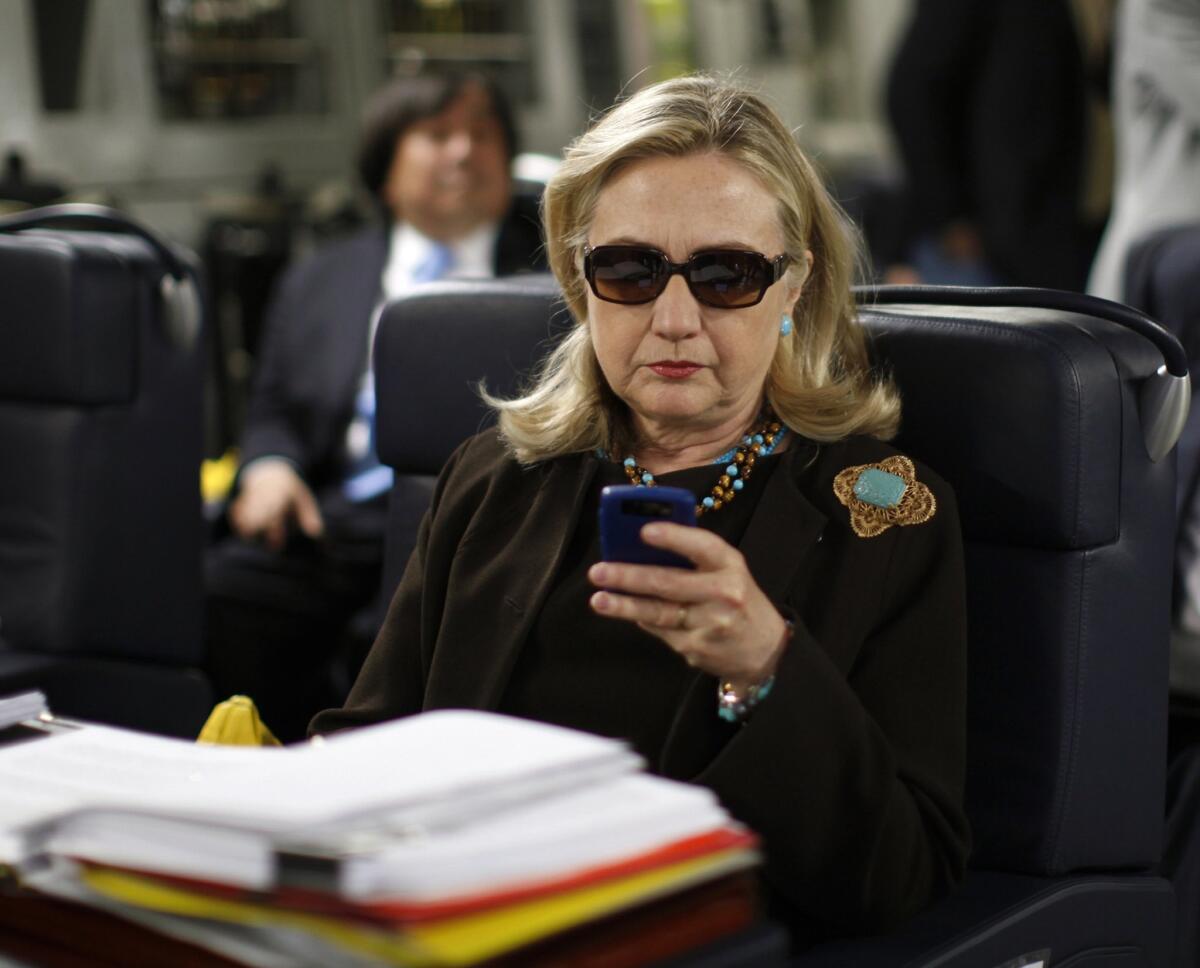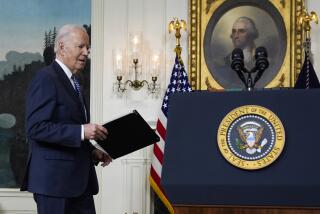White House defers questions on Hillary Clinton’s private email use

The White House gently distanced itself Friday from the controversy swirling around former Secretary of State Hillary Rodham Clinton and State Department officials over Clinton’s use of a personal email account during her four years in office.
Amid growing criticism of the practice from Republicans and open-records advocates, White House senior advisor Valerie Jarrett said the Obama administration had set a policy of requiring federal officials to use only agency-run email addresses, and made departmental officials responsible for seeing that it was followed.
“The president has a very firm policy that email should be kept on government systems,” Jarrett, one of Obama’s inner circle, said on the Bloomberg TV show “Market Makers.” “We established the policy here, but then we leave it up to every single agency to determine how to adhere to that policy.”
Separately, a government official said the White House general counsel’s office, which had a role in overseeing record-keeping rules, knew nothing of Clinton’s use of the personal email account during her term. The legal office learned of the practice late last year, said the official, who declined to be identified because he was not authorized to speak on the subject.
Critics say Clinton’s use of a special “homebrew” server linked to her Chappaqua, N.Y., residence gave her special control over her communications, and left uncertain whether she had complied fully with federal rules requiring such records to be archived and retrievable.
The State Department has begun reviewing 55,000 pages of Clinton’s emails to see whether they comply with disclosure rules and can be released to the public. The process will take months to complete, officials say, probably keeping the controversy alive until long after the expected formal announcement of Clinton’s presidential candidacy next month.
The White House has been seeking to hand off questions about the controversy to Clinton and State Department officials.
But Clinton’s team, which asserts nothing improper took place, has said little. And State Department officials have been unable so far to explain whether anyone at the department reviewed Clinton’s plans in advance, or checked to see that her system met security standards for internal communications.
At a daily State Department briefing on Friday, spokeswoman Marie Harf was asked whether the department’s lawyers or other officials were aware of Clinton’s plans and gave permission for them.
“I don’t have details to answer that question for you,” she said.
She said the department’s look at the emails wasn’t aimed at determining whether they broke any rules, but only whether
the material should be released.
Harf wouldn’t comment on what officials would do if any violations were found, saying, “I’m not going to prejudge the outcome of the review.”
Two congressional panels, the House Select Committee on Benghazi and the House Oversight and Government Reform Committee, are investigating the emails, and other committees are considering whether to take part. The Benghazi panel, which has been examining Clinton’s role in the Sept. 11, 2012, fatal attack on U.S. facilities in the Libyan city, subpoenaed State Department documents on Wednesday.
Clinton’s possible rivals are also paying attention.
Former Florida Gov. Jeb Bush, in an interview with Radio Iowa on Friday, suggested that Clinton’s use of a private server was a security risk.
“For security purposes, you need to be behind a firewall that recognizes the world for what it is, and it’s been a dangerous world and security would mean that you couldn’t have a private server,” he said. “It’s a little baffling, to be honest with you, that didn’t come up in Secretary Clinton’s thought process.”
Democratic members of the Benghazi committee on Friday sent a letter to its chairman, Rep. Trey Gowdy (R-S.C.), complaining that the matter was being used by Republicans to attack Clinton.
“We urge you to withdraw the ill-considered subpoena — whose issuance to a cooperating witness served only to highlight the increasingly partisan nature of the committee’s focus — and to immediately publish the secretary’s emails in their entirety, as she has requested,” they wrote.
paul.richter@latimes.com
@richtpau
More to Read
Get the L.A. Times Politics newsletter
Deeply reported insights into legislation, politics and policy from Sacramento, Washington and beyond. In your inbox three times per week.
You may occasionally receive promotional content from the Los Angeles Times.







